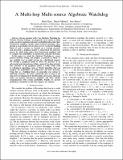A multi-hop multi-source Algebraic Watchdog
Author(s)
Kim, MinJi; Medard, Muriel; Barros, Joao
DownloadMedard_A multi-hop.pdf (334.4Kb)
PUBLISHER_POLICY
Publisher Policy
Article is made available in accordance with the publisher's policy and may be subject to US copyright law. Please refer to the publisher's site for terms of use.
Terms of use
Metadata
Show full item recordAbstract
In our previous work (`An Algebraic Watchdog for Wireless Network Coding'), we proposed a new scheme in which nodes can detect malicious behaviors probabilistically, police their downstream neighbors locally using overheard messages; thus, provide a secure global self-checking network. As the first building block of such a system, we focused on a two-hop network, and presented a graphical model to understand the inference process by which nodes police their downstream neighbors and to compute the probabilities of misdetection and false detection. In this paper, we extend the Algebraic Watchdog to a more general network setting, and propose a protocol in which we can establish trust in coded systems in a distributed manner. We develop a graphical model to detect the presence of an adversarial node downstream within a general two-hop network. The structure of the graphical model (a trellis) lends itself to well-known algorithms, such as Viterbi algorithm, that can compute the probabilities of misdetection and false detection. Using this as a building block, we generalize our scheme to multi-hop networks. We show analytically that as long as the min-cut is not dominated by the Byzantine adversaries, upstream nodes can monitor downstream neighbors and allow reliable communication with certain probability. Finally, we present preliminary simulation results that support our analysis.
Date issued
2010-09Department
Massachusetts Institute of Technology. Department of Electrical Engineering and Computer Science; Massachusetts Institute of Technology. Research Laboratory of ElectronicsJournal
Proceedings of the IEEE Information Theory Workshop (ITW), 2010
Publisher
Institute of Electrical and Electronics Engineers (IEEE)
Citation
Kim, MinJi, Muriel Medard, and Joao Barros. “A Multi-hop Multi-source Algebraic Watchdog.” IEEE Information Theory Workshop (ITW), 2010. 1–5. © Copyright 2010 IEEE
Version: Final published version
ISBN
978-1-4244-8263-4
978-1-4244-8262-7